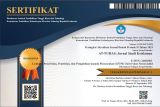Mediasi dalam Perspektif Maqashid Syariah: Studi tentang Perceraian di Pengadilan Agama
Authors (s)
(1) * Muhammad Zainuddin Sunarto
 (Universitas Nurul Jadid, Probolinggo)
(Universitas Nurul Jadid, Probolinggo) Indonesia
(*) Corresponding Author
Abstractin a marriage relationship, there will must be a conflict between husband and wife, this cannot be denied because each partner has a sectoral ego. The conflict can sometimes be resolved peacefully, but not the least that ends in divorce. The divorce process is arranged, must go through the trial process of the Religious Court with the specified procedural law. The proceedings for a lawsuit in the Religious Court must go through a mediation process between the two parties. Mediation is a way in the process of resolving disputes outside the trial in the presence of a third party tasked with reconciling the parties. Mediation is a mandate of the law to be carried out, so that the proceedings in court can be in accordance with the principle, which is fast, simple and inexpensive. The necessity of conducting mediation in a court, especially a religious court, is to reduce the number of divorces which is increasing in number over the years. Solving problems through mediation, is also a manifestation of maqashid al-shariah, namely hifdz al-nasl, because when there are problems in marriage, the marriage relationship will be damaged and problems will occur. Following up on the maqashid, in Indonesia there was a requirement to carry out mediation in the settlement of every case that went to court. The main objective is to minimize cases that must be decided, so that mediation can be resolved peacefully and safely.
Keywords: Maqashid Al-Shariah, Mediation, Religious Court |
Full Text: PDF
Refbacks
- There are currently no refbacks.
Copyright (c) 2019 Muhammad Zainuddin Sunarto
This journal is licensed under a
Creative Commons Attribution-ShareAlike 4.0 International License
P-ISSN: 2355-567X, E-ISSN: 2460-1063





.png)






